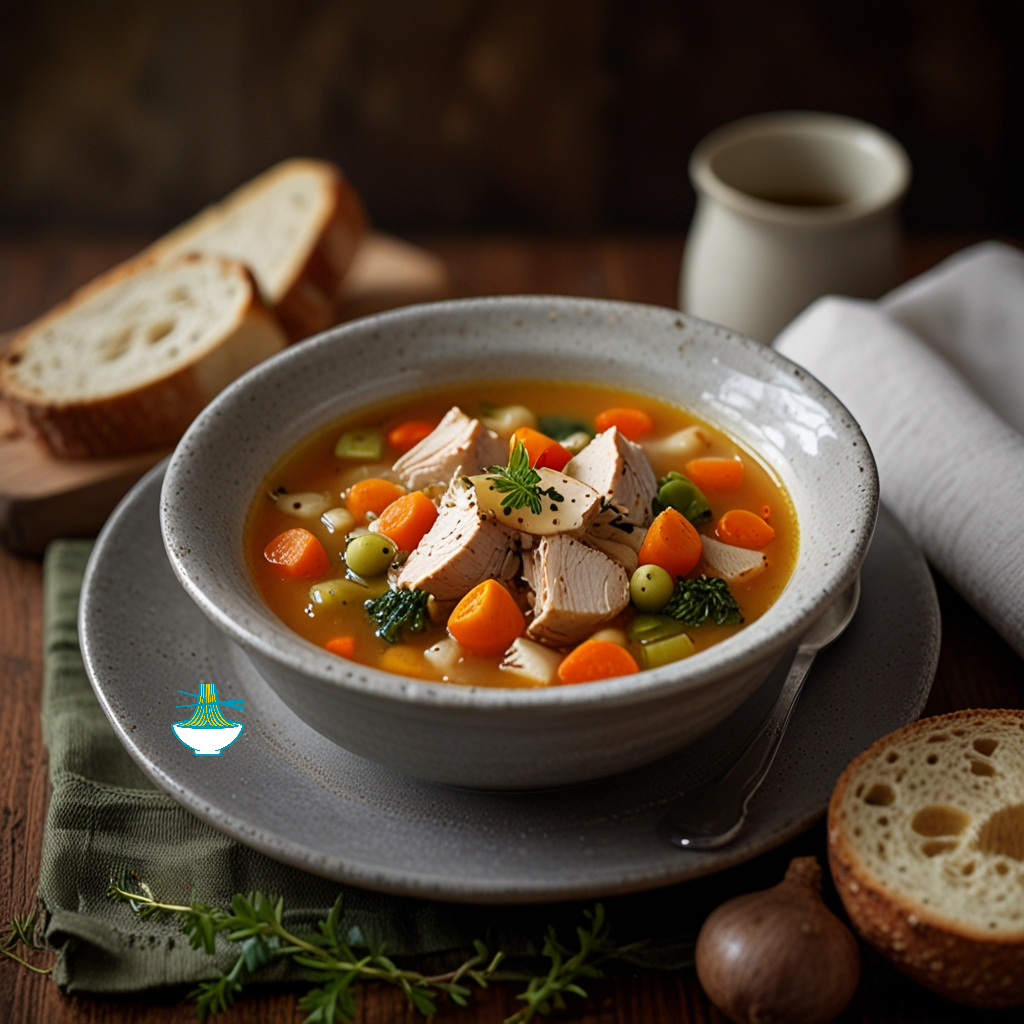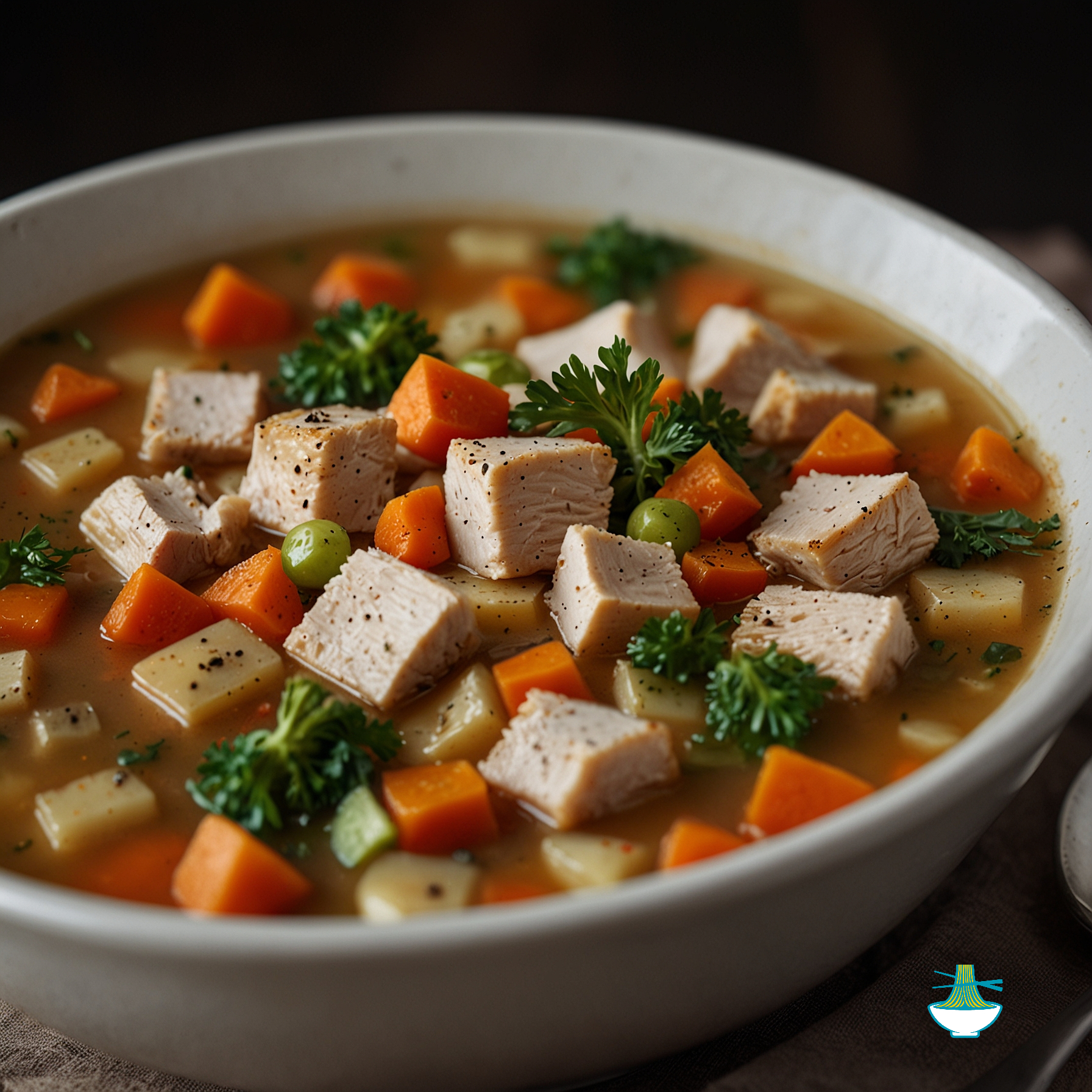Chicken and Vegetable Soup is a classic dish known for its comforting and nourishing properties, making it particularly beneficial for cancer patients. This simple, easy-to-digest soup combines lean chicken breast with vegetables like carrots, celery, and onions, providing essential vitamins, minerals, and proteins. These nutrients support overall health and can be especially helpful for those undergoing treatment, as the soup is gentle on the stomach while being nutrient-dense.

Chicken soup has been valued for its healing properties for centuries, with ancient civilizations like the Egyptians, Greeks, and Chinese using it as a remedy. Over time, variations developed, incorporating local ingredients. Modern Chicken and Vegetable Soup is nutrient-dense and easy to digest, making it ideal for those needing immune support, especially cancer patients. As one of the best soups for cancer patients, it remains a comforting and nourishing choice for anyone seeking a healthy meal.

Ingredients:
- 1 boneless, skinless chicken breast
- 2 carrots, peeled and sliced
- 2 celery stalks, sliced
- 1 onion, diced
- 2 cloves garlic, minced
- 4 cups low-sodium chicken broth
- Salt and pepper to taste
- Fresh parsley, chopped (optional, for garnish)
Note: Choose chickens raised without hormones or medications for better animal welfare and healthier food options.
Method:
1. Place a large pot over medium heat.
2. Add chicken breast, carrots, celery, onion, garlic, and chicken broth to the pot.
3. Bring the mixture to a boil.
4. Reduce heat to low and let it simmer for 20-25 minutes until the chicken is cooked through and vegetables are tender.
5. Remove the chicken breast from the pot and shred it using two forks.
6. Return shredded chicken to the pot and stir to combine.
7. Season with salt and pepper to taste.
8. Ladle the soup into bowls and garnish with chopped parsley if desired.
9. Serve hot and enjoy!
Nutrition Value:
1. Boneless, Skinless Chicken Breast:
- Calories: Approximately 165 calories per 3.5 ounces (100 grams).
- Macronutrients: Negligible carbohydrates, high protein content (approximately 31 grams per 3.5 ounces), low in fat (around 3.6 grams per 3.5 ounces).
- Sodium: Varies depending on preparation, but generally low.
- Cholesterol: Approximately 85 milligrams per 3.5 ounces.
- Vitamins & Minerals: Rich in niacin, vitamin B6, phosphorus, and selenium.
- Nutritional Benefit: Provides high-quality protein necessary for tissue repair and muscle growth. Also contains essential vitamins and minerals important for overall health.
2. Carrots:
- Calories: Approximately 41 calories per 100 grams.
- Macronutrients: Primarily carbohydrates (around 10 grams per 100 grams), with a small amount of protein and fat.
- Sodium: Low.
- Cholesterol: None.
- Vitamins & Minerals: High in vitamin A, vitamin K1, potassium, and antioxidants like beta-carotene.
- Nutritional Benefit: Supports eye health, immune function, and provides antioxidants that may help reduce the risk of chronic diseases.
3. Celery:
- Calories: Approximately 16 calories per 100 grams.
- Macronutrients: Mostly carbohydrates (around 3 grams per 100 grams), with negligible protein and fat.
- Sodium: Low.
- Cholesterol: None.
- Vitamins & Minerals: Contains vitamin K, potassium, and antioxidants.
- Nutritional Benefit: Low in calories and high in water content, celery adds crunch and fiber to the soup while providing vitamins and minerals important for heart health and digestion.
4. Onion:
- Calories: Approximately 40 calories per 100 grams.
- Macronutrients: Mostly carbohydrates (around 9 grams per 100 grams), with negligible protein and fat.
- Sodium: Very low.
- Cholesterol: None.
- Vitamins & Minerals: Rich in vitamin C, vitamin B6, folate, and antioxidants.
- Nutritional Benefit: Adds flavor to the soup while providing vitamins and antioxidants that support immune function and may have anti-inflammatory properties.
5. Garlic:
- Calories: Approximately 149 calories per 100 grams.
- Macronutrients: Mostly carbohydrates (around 33 grams per 100 grams), with moderate protein and minimal fat.
- Sodium: Very low.
- Cholesterol: None.
- Vitamins & Minerals: High in vitamin C, vitamin B6, manganese, and antioxidants.
- Nutritional Benefit: Known for its potential health benefits, including immune support, heart health, and anti-inflammatory properties. Adds flavor to the soup without adding significant calories.
6. Low-Sodium Chicken Broth:
- Nutritional content can vary, but typically:
- Calories: Around 5-10 calories per cup.
- Macronutrients: Low in carbohydrates and fat, with some protein.
- Sodium: Low in low-sodium varieties.
- Cholesterol: Varies.
- Vitamins & Minerals: Can contain some vitamins and minerals depending on the ingredients.
- Nutritional Benefit: Provides a flavorful base for the soup without adding significant calories. Opting for low-sodium broth helps control sodium intake, important for heart health.
7. Salt and Pepper:
- Calories: Negligible.
- Macronutrients: Negligible.
- Sodium: Depends on the amount added, should be used sparingly.
- Cholesterol: None.
- Nutritional Benefit: Adds flavor to the soup but should be used in moderation, especially for those watching their sodium intake.
8. Fresh Parsley (optional, for garnish):
- Calories: Approximately 36 calories per 100 grams.
- Macronutrients: Mostly carbohydrates (around 7 grams per 100 grams), with small amounts of protein and fat.
- Sodium: Low.
- Cholesterol: None.
- Vitamins & Minerals: High in vitamin K, vitamin C, and antioxidants.
- Nutritional Benefit: Adds freshness and color to the dish, while providing vitamins and antioxidants that support overall health, including immune function and bone health.


Comments